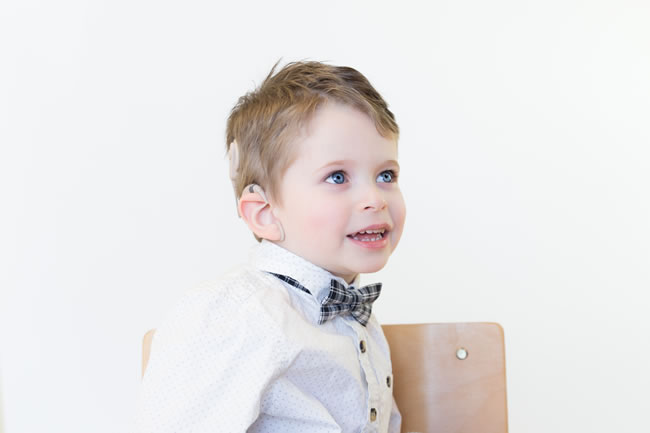Children's Cochlear Implant Program

Central Speech and Hearing Clinic is the only cochlear implant centre in Manitoba. We provide evaluation, fitting and (re)habilitation for all cochlear implant recipients. Surgeries are performed at the Winnipeg Children’s Hospital.
Not all children will be candidates for cochlear implantation. Children must be assessed by a team that includes otolaryngology, specialists in listening and spoken language, audiologists and other professionals as needed. Input from parents and caregivers is essential to the decision-making process.
Recommendation for cochlear implantation is a collaboration among professionals and families. We accept referrals for cochlear implant candidacy from audiologists, physicians, speech-language pathologists and families.
Criteria for Cochlear Implantation – Children
- Bilateral severe to profound sensorineural hearing loss
- Congenital (present at birth)
- Pre-lingual (acquired before the age of two) or
- Post-lingual (acquired after the development of speech and language)
- Inadequate benefit from hearing aids (determined through a trial period of consistent hearing aid use)
- Participation in pre-implant evaluations and post implant follow-up services
- Family commitment to participating in Auditory-Verbal Therapy
- Enrolment in an educational setting that focuses on listening and spoken language as the primary mode of communication
- Appropriate expectations and motivation of caregivers and child to develop spoken language skills
- No medical contraindications to cochlear implantation
- For information on Manitoba`s Surgical Hearing Implant Program: umanitoba.ca/faculties/health_sciences/...
Pediatric Cochlear Implant Candidacy Process
- Once a referral is received by Central Speech and Hearing Clinic, the family will attend an information session with an Audiologist and a Listening and Spoken Language Specialist (LSLS) to discuss the details of cochlear implants and the candidacy process.
- A series of Audiology appointments will be scheduled to determine how much benefit the child is receiving from hearing aids. This is a time for families to learn about the benefits and outcomes for children with cochlear implants, talk about expectations, and ask questions.
- A series of formal and informal assessments is also scheduled over this period of time with a Listening and Spoken Language Specialist. During the therapy sessions, the LSLS will extensively assess a child's auditory (listening), language, speech, social, and cognitive development. Families are coached in ways to teach their child to learn to listen.
- A referral is made to the implant surgeon for medical assessment.
- The cochlear implant team will meet to discuss the child's candidacy profile.
- At the end of this candidacy period, a recommendation will be made to coninue or discontinue candidacy
- If cochlear implantation is not recommended or chosen by the family, options for audiological and (re)habilitation services will be discussed.
- If cochlear implantation is recommended, a surgical date will be coordinated.
Cochlear Implant Activation, Audiological Follow-up and Therapy
- There is a period of 4 to 6 weeks following surgery to allow for healing. During this time, the child may have limited or no access to sound and does not wear a hearing aid in the implanted ear(s).
- After the healing period, the cochlear implant speech processors will be activated and the equipment reviewed.
- It is difficult to know what to expect on the day of activation. Some children are excited, others cry, while some show no reaction at all. The following are some resources to help guide your expectations:
- The child will be seen for cochlear implant programming and audiological management at regular intervals within the first month. Thereafter, standard follow-up will occur every three months for the first year, or as needed. Our audiologists closely follow the Alexander Graham Bell Association’s Recommended Protocol for Audiological Assessment, Hearing Aid and Cochlear Implant Evaluation, and Follow-up - see more at: www.listeningandspokenlanguage.org/Protocol.Audiological.Assessment/
- Therapy and parental involvement is the most important part of cochlear implant follow-up. The goal for most children with cochlear implants is to learn to listen and talk, close the language gap with typical-hearing peers, learn to read and write, develop friendships and self-advocacy skills, and go to their neighbourhood schools. For more information on our Auditory-Verbal Therapy program, click here.
Factors Affecting Cochlear Implant Outcomes
Success with a cochlear implant depends on many factors:
- Full-time daily use of the cochlear implant(s)
- Family and child’s motivation
- Amount of family involvement, support & interaction with the child
- Participation in auditory-focused habilitation
- The age at which the child became deaf
- The length of time the child has been deaf
- The primary mode of communication used in the home and educational setting
- Prior use of hearing aids
- The child’s listening, speech and language skills prior to implantation
- Presence of additional disabilities or developmental delays
Parents and caregivers should be aware that while cochlear implants do not provide normal hearing, they are an excellent tool to give sound to children with severe to profound hearing loss. Cochlear implants can give children access to all the sounds of speech, music and the world around us. With dedicated listening and speaking practice, children with cochlear implants can understand and develop clear speech, and reach their full potential.